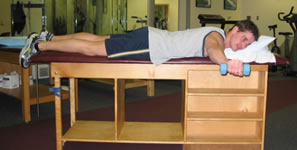|
BOOK NOW |
ASK ABOUT YOUR PAIN |
Home > Blog > Hand Therapy & Customized Splinting > Conditions > Finger, Hand, Wrist, Forearm & Elbow Conditions > Rotator Cuff Tears Hand Therapy
“Working with a knowledgeable hand therapist can make the difference between success and failure in complex hand surgical cases. The therapist extends the continuum of our care, as well as functioning as coach and trainer for our patients.”
Marybeth Ezaki, MD, Past President, American Society for Surgery of the Hand
In Phoenix Rehab, our senior hand therapists are experienced licensed and dedicated therapists (physiotherapists and/or occupational therapists) who specialized ONLY in the rehabilitation, treatment and management of painful fingers, hands, wrists, forearm & elbow conditions, because of interest, passion and expertise.
Rotator Cuff Tears Hand Therapy

Front view of right shoulder
Our rotator cuff muscles are a group of muscles and tendons in the shoulder that connects the bone in the arm (humerus) to the shoulder blade (scapula).
The rotator cuff muscles allows for stability and flexibility while moving the shoulder. There are four muscles in the rotator cuff, and any of these can be injured or torn.
When this happens, there may be pain or weakness.
Sometimes, a rotator cuff tear will prevent a person from being able to raise his or her arm at all.
What are the causes of a rotator cuff tear?
Rotator cuff tears may result from an injury or progress over time.
Injuries can be caused by a fall, blow or strong force pulling the arm. Tears that occur over time tend to be more common and result from wear and tear of the rotator cuff.
Repetitive overhead activities cause the most damage to the rotator cuff; these can include
- painting walls
- washing windows
- playing tennis
- swimming or
- lifting weights incorrectly
Unfortunately, our daily posture is also a factor, as slouching or hunching your shoulders forward decreases the space available for the rotator cuff to move freely, causing increased unnecessary friction.
This can lead to inflammation and, eventually, the rotator cuff will injure and tear.
What are the symptoms of a rotator cuff tear?

Rotator cuff tears may cause pain in the shoulder and upper arm
If there is a tear, there may be pain in the upper arm, which can worsen with
- movement
- lifting
- poor posture and
- sleeping
Depending on the type of tear, there may also be difficulty lifting the arm or reaching behind the head and back.
What is the treatment for a rotator cuff tear?
First, you will need to consult with a doctor to evaluate the shoulder (contact us if you want us to assess your shoulder first or to recommend shoulder doctors we work with).
Whether or not surgery is needed, both shoulder physiotherapy and hand therapy is recommended to
- decrease pain
- improve posture
- improve range of motion
- improve strength
With therapy, many patients have relief of their symptoms and may be even able to avoid surgery.
That being said, if corrective surgery is necessary to repair the torn tendons, the arm may be held in a sling for four to six weeks.
After surgery, our senior hand therapists and senior physiotherapists will explain how to safely move while protecting the repair.
A repair can be damaged if these restrictions are not followed.
What can a hand therapist do for me?
Following surgery, our senior physiotherapists and hand therapists will monitor and guide a patient’s progress based on the surgeon’s recommendations.
Initially, therapy will involve gaining motion in the shoulder through passive movement, where the good arm works to move the arm that was operated on.
Heat and ice may be used to help manage pain.
Our hand therapist can also demonstrate safe performance of daily activities and sleeping positions to ease pain at night. As the repair heals, the arm can move unassisted, and eventually strengthening can begin.
Exercises to work on posture and core strength might also be a part of therapy. When the repair is strong enough, we will help with return to hobbies, sports and work.

Patients may also receive the following hand therapy treatment modalities:
- cold therapy
- heat therapy
- moist heat paraffin wax therapy
- manual therapy
- joint mobilization
- ultrasound therapy
- stretching exercises
- strengthening exercises
- scar management
- etc